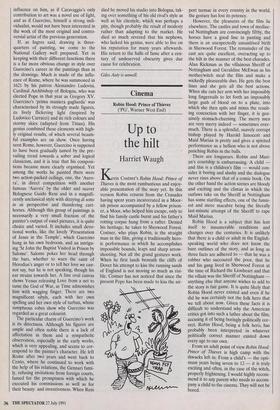Cinema
Up to the hilt
Harriet Waugh
Costner's Robin Hood: Prince of Thieves is the most rumbustious and enjoy- able presentation of the story yet. In this version Robin returns from the Crusades having spent years incarcerated in a Moor- ish prison accompanied by a fellow prison- er, a Moor, who helped him escape, only to find his family castle burnt and his father's rotting corpse hung from a rafter. Denied his heritage, he takes to Sherwood Forest. Costner, who plays Robin, is the straight man in the film, giving a traditionally hero- ic performance in which he accomplishes impossible bounds, leaps and sharp arrow- shooting. Not all the grand gestures work. When he first lands beneath the cliffs of Dover his attempt to kiss the running sands of England is not moving so much as risi- ble. Costner has not noticed that since the present Pope has been made to kiss the air- port tarmac in every country in the world, the gesture has lost its potency.
However, the pleasures of the film lie elsewhere. The castles and town of mediae- val Nottingham are convincingly filthy, the horses have a good line in panting and there is an unexpectedly unsanitised birth in Sherwood Forest. The remainder of the cast are quite excellent, overacting up to the hilt in the manner of the best charades. Alan Rickman as the villainous Sheriff of Nottingham and Geraldine McEwan as his mother/witch steal the film and make a wickedly pleasurable duo. He gets the best lines and she gets all the best actions. When she cuts her arm with her impossibly long fingernails to let forth an impossibly large gush of blood on to a plate, into which she then spits and mixes the result- ing concoction with her finger, it is gen- uinely stomach-churning. The merry men are very merry indeed — sometimes over- much. There is a splendid, suavely corrupt bishop played by Harold Innocent and Maid Marian is pretty and gives a spirited performance as a hellion who is not above punching Robin in the balls.
There are longueurs. Robin and Mari- an's courtship is embarrassing. A child and this is a children's film — would con- sider it boring and slushy and the dialogue never rises above that of a comic book. On the other hand the action scenes are bloody and exciting and the climax in which the outlaws take on the Sheriff in Nottingham has some startling effects, one of the funni- est and more macabre being the literally last-minute attempt of the Sheriff to rape Maid Marian.
Robin Hood is a subject that has lent itself to innumerable renditions and changes over the centuries. It is unlikely that there is a child or adult in the English- speaking world who does not know the bare outlines of the story, and as long as three facts are adhered to — that he was a robber who succoured the poor, that he and his gang lived in Sherwood Forest at the time of Richard the Lionheart and that the villain was the Sheriff of Nottingham anything else that anyone wishes to add to the story is fair game. It is quite likely that Robin Hood never existed and even if he did he was certainly not the folk hero that we tell about now. Given these facts it is difficult to understand why the American critics got into such a lather about the film, accusing it of being boringly politically cor- rect. Robin Hood, being a folk hero, has probably been interpreted in whatever politically correct manner existed down every age to our own.
From an adult point of view Robin Hood: Prince of Thieves is high camp with the thwacks left in. From a child's — the opti- mum years being seven to 12 — it is truly exciting and often, in the case of the witch, properly frightening. I would highly recom- mend it to any parent who needs to accom- pany a child to the cinema. They will not be bored.


















































 Previous page
Previous page